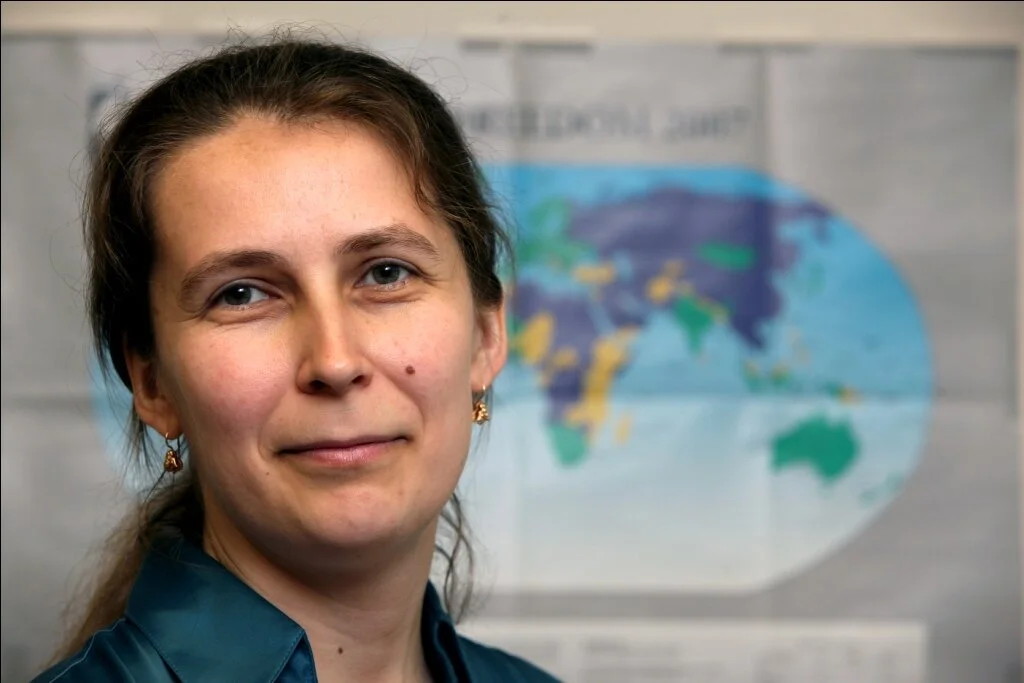Olena Nikolayenko
Professor and Chair of the Department of Political Science, Fordham University
About Me
Olena Nikolayenko is Professor and Chair of the Department of Political Science at Fordham University. Originally from Ukraine, she received her Ph.D. in political science from the University of Toronto and held visiting appointments at the Stanford Center on Adolescence and the Center on Democracy, Development, and the Rule of Law at Stanford University, the Davis Center for Russian and Eurasian Studies at Harvard University, the Princeton Institute for International and Regional Studies at Princeton University, and the Department of Sociology at the National University of Kyiv–Mohyla Academy, Ukraine.
Her research was supported by the American Political Science Association, Canadian Institute of Ukrainian Studies, the International Center on Nonviolent Conflict, Jacobs Foundation (Dissertation and Young Investigator Grant in Adolescence and Youth Research), Open Society Institute, the Social Sciences and Humanities Research Council of Canada, and the U.S. Department of State (Title VIII Program for Research and Training on Eastern Europe and the Independent States of the Former Soviet Union). Her research interests include comparative democratization, contentious politics, women’s activism, and youth, with a regional focus on Eastern Europe, Russia, and Central Asia. Her recent book, Youth Movements and Elections in Eastern Europe (Cambridge University Press 2017), examined tactical interactions between nonviolent youth movements and incumbent governments in Azerbaijan, Belarus, Georgia, Serbia, and Ukraine. Her current book project, tentatively titled Invisible Revolutionaries: Women’s Participation in the 2013-2014 Revolution of Dignity in Ukraine, examines women’s engagement in contentious politics.
At Fordham, Professor Nikolayenko regularly teaches an interdisciplinary capstone course Youth and Politics and provides mentorship for students who present findings from their projects at the National Conference on Undergraduate Research. How do young people around the globe participate in politics? What influences youth’s voting behavior? Why are some youngsters more likely to join protests against social injustice, racism, and climate change? What is the impact of family, schools, and social media on youth’s political engagement? The course addresses these issues from an interdisciplinary perspective by drawing upon literature in anthropology, communication, political science, psychology, and sociology.
contentious politics; youth movements; women’s activism; political behavior
More Information:
Selected Publications
Books
Youth Movements and Elections in Eastern Europe (Cambridge University Press, 2017) Cambridge Studies in Contentious Politics Book Series
Citizens in the Making in Post-Soviet States (Routledge, 2011) BASEES/Routledge Series on Russian and East European Studies
Articles
“Youth Media Consumption and Perceptions of Electoral Integrity in Kazakhstan and Kyrgyzstan.” Demokratizatsiya: Journal of Post-Soviet Democratization 23, no. 3 (2015): 257–277
“Youth Movements and Elections in Belarus.” Europe-Asia Studies 67, no. 3 (2015): 468–492
“Origins of the Movement’s Strategy: The Case of the Serbian Youth Movement Otpor.” International Political Science Review 34, no. 2 (2013): 140–158
“The Revolt of the Post-Soviet Generation: Youth Movements in Serbia, Georgia, and Ukraine.” Comparative Politics 39, no. 2 (2007): 169–188

